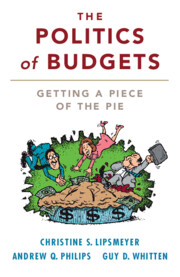Book contents
- Frontmatter
- Dedication
- Contents
- Figures
- Tables
- Acknowledgements
- 1 Introduction
- 2 A Theory of Budgets
- 3 Political Competition and the Expenditure Pie
- 4 The Effects of Elections, Economics, and International Shocks on the Expenditure Pie
- 5 Four Sides of the Budgetary Ledger
- 6 The Effects of Elections, Economics, and External Shocks on the Budgetary Ledger
- 7 Conclusion: The Budgetary Mix
- References
- Index
6 - The Effects of Elections, Economics, and External Shocks on the Budgetary Ledger
Published online by Cambridge University Press: 16 March 2023
- Frontmatter
- Dedication
- Contents
- Figures
- Tables
- Acknowledgements
- 1 Introduction
- 2 A Theory of Budgets
- 3 Political Competition and the Expenditure Pie
- 4 The Effects of Elections, Economics, and International Shocks on the Expenditure Pie
- 5 Four Sides of the Budgetary Ledger
- 6 The Effects of Elections, Economics, and External Shocks on the Budgetary Ledger
- 7 Conclusion: The Budgetary Mix
- References
- Index
Summary
Whether domestic and international contexts affect governments’ abilities to alter total expenditures, revenues, deficits, and budgetary volatility is our focus in Chapter 6. We develop expectations about the influence of government ideology and majority status together with contextual factors and other budgetary components on each of our four budgetary components. For the domestic contexts, we consider election timing, unemployment, and economic growth. In the international realm, we focus on globalization and conflict involvement. Building on the results from the panel vector autoregressive (pVAR) model from Chapter 5, we specify separate reduced-form models for each of our budget component variables to test our theoretical expectations. Across the results we present in this chapter, we find very few statistically significant effects, especially in terms of long-run effects, on the four budgetary components. The strongest results are for the influence of contextual factors on budgetary volatility, specifically when increasing unemployment and economic openness. When unemployment or economic openness increases, we find that budgetary volatility increases under majority left governments in both the short- and long-runs. This evidence indicates that right and left governments differ in how much they respond to both domestic and international contexts.
- Type
- Chapter
- Information
- The Politics of BudgetsGetting a Piece of the Pie, pp. 203 - 243Publisher: Cambridge University PressPrint publication year: 2023

